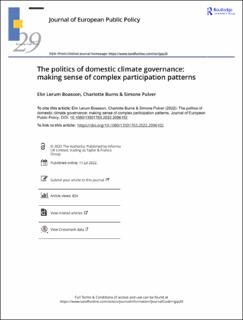The politics of domestic climate governance: making sense of complex participation patterns
Peer reviewed, Journal article
Published version

Åpne
Permanent lenke
https://hdl.handle.net/11250/3115921Utgivelsesdato
2022Metadata
Vis full innførselSamlinger
- Journal articles [478]
Sammendrag
This article reviews literature on six actor groups engaged in domestic mitigation governance. It evaluates the usefulness of three climate governance models: market failure, socio-technological transition and public support. For each group, three modes of action are considered: influencing, decision-making and implementing. The public support model is found to best capture the wide range of actors and real-world, complex participation patterns of domestic climate governance. The socio-technological transitions and market failure models in their narrow focus on political and business actors ignore the influencing roles of other groups, such as climate advocacy organizations, anti-climate action groups, Indigenous people’s organizations and labor unions. However, they offer more insight on actor engagement in decision-making and implementation, roles mostly ignored by the public support model. Overall, more systematic comparative research is needed on a wider range of actors, on domestic climate governance in the global South, on differences across countries, sectors and policy domains and on interactions between actors.
